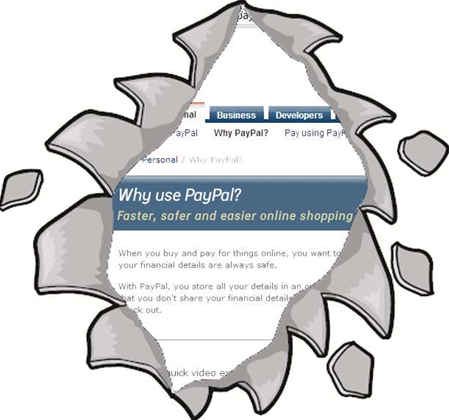Security flaws have been reported in PayPal that allow user accounts to be hijacked.

The flaw reported under its bug bounty program by Vulnerability Laboratory researchers allowed remote attackers to inject malicious code into the Paypal e-commerce website content management system and API.
The flaw is located in the software that verifies the identity of a customer receiving an online payment via their phone number ID. Vulnerability Lab says it can be patched by encoding the vulnerable input fields and the affected output mailing.
Other bugs discovered by the researchers include a client-side weakness in PayPal's official Chinese web application service, a persistent input validation vulnerability in the GP+ web app which supports its online sales stores, and a bug in its BillSAFE online payment service web application.
The GP+ and BillSAFE flaws allow remote attackers to inject their own malicious persistent script codes to compromise the apps. The bug in PayPal's Chinese web application service allows remote attackers to redirect the victim to an external malicious source or website.
PayPal entered the Chinese market in 2010 through an agreement with China UnionPay (CUP), the country's bankcard association, to allow Chinese consumers to use PayPal to shop online.
PayPal has issued a number of patches and updates for GP+ bugs in the second and third quarters of 2013. Vulnerability Lab's researchers have detailed patches for the other problems.
The bugs are the latest in a series of PayPal problems identified by the Vulnerability Lab research team this year – covering around 110 issues - operating through PayPal's bug bounty programme.
PayPal offers a scale of rewards for researchers who identify problems in its websites and apps, ranging from US$ 750 (£465) for cross-site scripting (XSS) and cross-site request forgery (CSRF) vulnerabilities, up to US$ 5,000 (£3,100) for SQL injection attacks and US$ 10,000 (£6,200) for remote code execution malware.
Vulnerability Lab Benjamin Kunz Mejri said his researchers have earned between US$ 20,000 (£12,400) and US$ 40,000 (£25,000) in rewards through the PayPal bounty scheme in 2012 and 2103.
PayPal was unavailable for comment.

_(33).jpg&h=140&w=231&c=1&s=0)

_(36).jpg&h=140&w=231&c=1&s=0)
.png&h=140&w=231&c=1&s=0)





 iTnews Executive Retreat - Security Leaders Edition
iTnews Executive Retreat - Security Leaders Edition
 iTnews Cloud Covered Breakfast Summit
iTnews Cloud Covered Breakfast Summit
 The 2026 iAwards
The 2026 iAwards












_(1).jpg&h=140&w=231&c=1&s=0)



